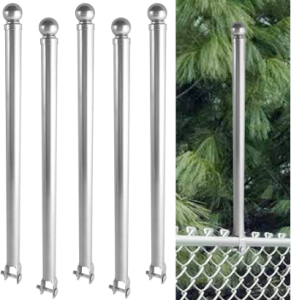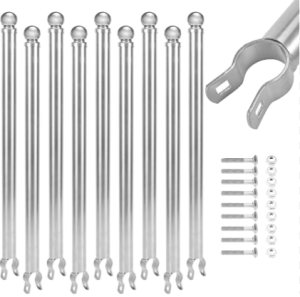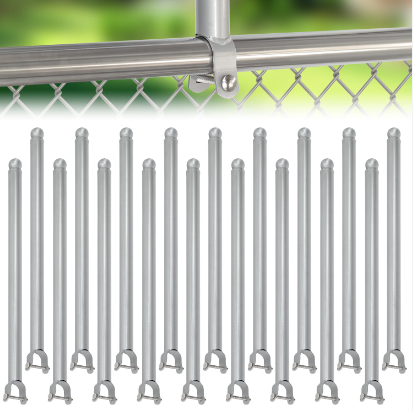Fence Extender For Dogs
Dogs are not just pets; they are cherished members of our families. We want to ensure their safety and happiness at all times, especially when they are outdoors. One common challenge dog owners face is keeping their furry friends within the boundaries of their yard. To address this issue, many turn to fence extenders. In this guide, we’ll explore the world of fence extenders for dogs and present some of the best options available.
Why You Need a Fence Extender for Dogs
Fence extenders are essential for several reasons. Firstly, they help prevent your dog from escaping the yard and getting lost or injured. Secondly, they protect your dog from potential dangers outside the yard, such as traffic or wild animals. Lastly, they give your dog the freedom to roam and play without constant supervision. Here are some key reasons why you should consider a fence extender for your furry friend:
Safety: Safety should always be a top priority for your dog. A fence extender can keep them away from dangers like busy streets or unfriendly neighborhood dogs.

Exercise: Dogs need regular exercise to stay healthy and happy. A fence extender allows your pup to run and play freely within the safety of your yard.
Peace of Mind: Knowing that your dog is secure in your yard gives you peace of mind, especially when you can’t watch them 24/7.
Preventing Digging: Some dogs are natural diggers and can tunnel their way under a fence. A fence extender can prevent this behavior.
Privacy: If you have nosy neighbors or other dogs nearby, a fence extender can provide both you and your dog with some much-needed privacy.
Choosing the Right Fence Extender
When it comes to choosing the best fence extender for your dog, several factors need consideration. The type of fence you have, your dog’s size and temperament, and your budget all play a role in making the right choice. Here are some crucial aspects to keep in mind:
Fence Type: The type of fence you have will determine which extender is most suitable. Common types include chain-link, wooden, and vinyl fences. Some extenders are specifically designed for certain fence types, so be sure to check compatibility.
Dog Size: The size and breed of your dog matter. Larger, more energetic dogs may require a taller and sturdier fence extender, while smaller dogs might do fine with a lower, less robust option.
Material: Fence extenders come in various materials, including metal, plastic, and wood. Consider the durability of the material in relation to your dog’s temperament and the local weather conditions.

Height: The height of the fence extender is critical. It should be tall enough to prevent your dog from jumping over it but not so high that it obstructs your view or violates local regulations.
Installation: Some fence extenders are easy to install, while others may require professional help. Factor in installation costs and effort when making your decision.
Aesthetics: The appearance of the fence extender matters too. You’ll want it to blend in with your existing fence and enhance the overall look of your yard.
Top Fence Extenders for Dogs
Now that we’ve discussed why fence extenders are essential and how to choose the right one, let’s take a look at some of the best options available:
Petsafe Stubborn Dog In-Ground Fence: This in-ground fence system is perfect for larger, stubborn dogs. It provides a custom boundary for your dog and is suitable for yards up to 1.3 acres. The receiver collar offers multiple levels of correction to suit your dog’s temperament.
PetPeek Fence Window: If your dog is curious and loves to see what’s happening outside the yard, the PetPeek Fence Window is a fun and practical choice. It’s a transparent dome that you can install in your fence, allowing your dog to peer through and satisfy their curiosity.
SportDOG Brand In-Ground Fence System: This system is suitable for larger yards, covering up to 100 acres with additional wire. It’s a great choice for active dogs as it includes a vibration warning before static stimulation. The collar is waterproof and durable.
Zippity Outdoor Products ZP19028 Unassembled Madison Vinyl Gate Kit with Fence Wings: If you have a vinyl fence, this gate kit with fence wings is an excellent option. It not only extends the height of your fence but also adds a stylish gate for easy access.
Perma Child Safety Outdoor Retractable Baby Gate: If you’re looking for a more temporary solution, this retractable gate is ideal. It can be installed on various surfaces, including fences, and provides a safe barrier for your dog.
CO-Z 16 Panel Heavy Duty Metal Dog Playpen: If you prefer a playpen-style fence extender, this option offers versatility. You can configure the panels to create different shapes and sizes to suit your yard. It’s perfect for puppies and smaller dogs.
PetSafe Stay & Play Wireless Fence: This wireless fence system is an excellent choice for those who don’t want to dig up their yard for in-ground wires. It’s portable, making it ideal for camping trips or temporary setups.
How to Choose the Best Fence Extender for Dogs
Keeping your furry friend safe and secure within the boundaries of your yard is a top priority for dog owners. A fence extender can be an invaluable addition to your outdoor space, but with various options available, choosing the best one can be a daunting task. To ensure that you make the right choice, consider the following factors when selecting the best fence extender for your dogs:
Fence Type Compatibility
The first and foremost consideration is the type of fence you have in your yard. Different fence extenders are designed to work with specific fence types such as chain-link, wooden, vinyl, or wire. It’s crucial to choose an extender that is compatible with your existing fence to ensure a seamless installation.
Dog Size and Temperament
The size and temperament of your dog play a significant role in determining the appropriate fence extender. For larger, more active dogs, a taller and sturdier extender may be necessary to prevent them from jumping over or knocking it down. Smaller dogs or those with a calmer disposition may require a less robust option.
Material Durability
Fence extenders are made from various materials, including metal, plastic, and wood. Consider the durability of the material in relation to your dog’s behavior and the local weather conditions. Metal extenders tend to be the most robust, while plastic and wood options can be suitable for smaller dogs or less demanding situations.
Height of the Extender
The height of the fence extender is crucial in preventing your dog from escaping. It should be tall enough to deter your dog from attempting to jump over it. However, it should not be so high that it obstructs your view or violates any local regulations regarding fence height.
Ease of Installation
Consider your DIY skills and the effort required for installation. Some fence extenders are designed for easy installation by homeowners, while others may require professional assistance. Be sure to factor in installation costs and effort when making your decision.
Aesthetics
The appearance of the fence extender can affect the overall look of your yard. Choose an extender that complements your existing fence and enhances the visual appeal of your outdoor space. Some extenders are designed to blend seamlessly with various fence styles.
Additional Features
Depending on your specific needs and preferences, you may want to consider fence extenders with additional features. These can include gates for easy access, transparent panels for visibility, or wireless systems for more flexibility in setting boundaries.
Local Regulations
Check with your local authorities or homeowners’ association regarding any regulations or restrictions on fence extenders. Some areas have specific rules governing fence height and appearance, so ensure that your chosen extender complies with these regulations.
Budget
Last but not least, consider your budget. Fence extenders come in a wide price range, and it’s essential to find one that meets your needs without breaking the bank. Keep in mind that investing in a quality extender is an investment in your dog’s safety and your peace of mind.
Conclusion
In conclusion, a fence extender for dogs is a valuable investment for the safety and well-being of your furry friend. It provides them with the freedom to roam and play while ensuring they stay within the boundaries of your yard. When choosing a fence extender, consider factors such as your dog’s size and temperament, your existing fence type, and your budget. With the right fence extender in place, you can enjoy peace of mind knowing your dog is safe and secure, allowing both you and your pup to make the most of your outdoor space.
5 FAQs About the Best Keywords
What Are the Best Keywords for SEO?
Answer: The best keywords for SEO are those that are relevant to your content and have high search volume with relatively low competition. They should align with your business, products, or services and match what users are searching for. Long-tail keywords (phrases with three or more words) can be especially effective in targeting specific audiences.
How Do I Find the Best Keywords for My Website?
Answer: To find the best keywords for your website, start with thorough keyword research. Utilize keyword research tools like Google Keyword Planner, SEMrush, or Ahrefs to identify relevant keywords in your industry. Look for keywords with high search volume and consider user intent when selecting them.
Should I Focus on Short-Tail or Long-Tail Keywords?
Answer: Both short-tail and long-tail keywords have their place in SEO. Short-tail keywords are broader and have higher competition, while long-tail keywords are more specific and have lower competition. It’s often a good strategy to include a mix of both in your content to capture a wide range of search queries and cater to different user intents.
How Many Keywords Should I Target on a Single Page?
Answer: There’s no set rule for the number of keywords to target on a single page. Instead, focus on creating high-quality, valuable content that naturally incorporates relevant keywords. Overstuffing keywords can harm your SEO efforts. A good practice is to target one or two primary keywords and include related keywords and synonyms where they fit naturally.
Should I Update My Keywords Over Time?
Answer: Yes, it’s essential to periodically review and update your keywords. Search trends and user behavior change over time, so your keyword strategy should evolve accordingly. Regularly monitor your website’s performance, conduct fresh keyword research, and make adjustments to your content and SEO strategy as needed to stay competitive and relevant.
Remember that finding and using the best keywords is an ongoing process in the world of digital marketing. Keeping up with industry trends, user behavior, and search engine algorithms is essential for maintaining a strong online presence.
